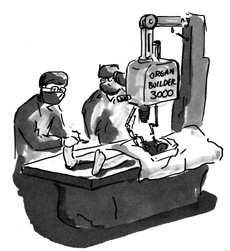Point/counterpoint: A tough cell

David Chen
Oct 11, 2004
Most people associate opposition to stem cell research with opposition to abortion.
On the issue of abortion, oddly, I happen to agree with the president of Students for G. W. Bush. Chuck Prochaska and I are both pro-choice.
However, just because I’m pro-choice does not mean I support stem cell research. I am against stem-cell research, because I believe the risks outweigh the benefits.
The potential benefits of stem-cell research are obvious. We could have
found a cure for President Reagan’s Alzheimer’s. We could make it possible for paralyzed people like Christopher Reeve to walk again. Cures for diabetes, multiple sclerosis and even cancer could be within our grasp.
Get The Daily Illini in your inbox!
The risks of stem-cell research, however, are not immediately apparent. Stem cells are primitive, unspecialized cells that can develop into any cell when grown in the proper environment. It might soon be technologically possible to cultivate one stem cell into an entirely new organ or a whole new body for that matter. I’m sure everyone can think of a few people they hope will 7never obtain access to the latter.
Ready-made bodies might be decades away, but researchers already are talking about growing organs for transplants. I think it’s pretty ridiculous to claim we could prevent a black market for embryos when you look at the job we’re doing trying to stop plants, powder and people from crossing our borders. I may be pro-choice, but I’m not pro-incentive.
Stem cell and genetic therapies are different from traditional medical therapies. They cross a whole new line in the medical realm. Those who decide in favor of these therapies will affect the rights of the rest of us. If we decide to accept children as they are given to us by God, nature or chance, will schools fail our children when they can’t keep up with the parents who “fixed” their unborn offspring’s projected IQ of 90?
Most people usually would do anything in their power to live their lives to the fullest and to ensure the best possible future for their children. I am no different. If extending my life 10 more years means living in a society where getting pregnant is a profitable business venture, which choice really helps me live my life to the fullest?
According to OverPopulation.org, 10 percent of the number of human beings that have ever lived are alive right now, while every hour, another species goes extinct.
This is clearly not sustainable. I don’t think learning how to extend people’s lives is really in our collective best interest.
While it might be possible to use stem-cell research in a way that benefits society as a whole, our current behavior shows that, as a species, we are not yet responsible enough to wield the enormous power of stem cells. When I look at the big picture – at our children’s children’s futures – I think it might be best if we don’t dive headfirst into the gene pool.
Zachary Schuster will appear Thursday. Adam Zmick is a senior in engineering. He can be reached at [email protected].





